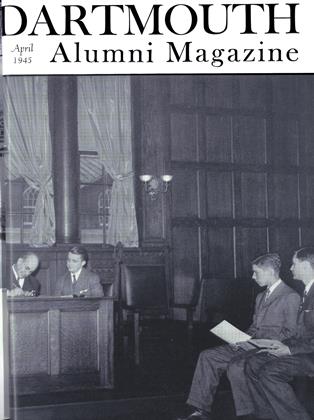by Robert Frost '96.Holt, 1945, 23 PP., $2.00.
This dramatic poem is both uproariously and subtly amusing. Those who have heard Mr. Frost declare that he is never more serious than when he is joking shouldn't be surprised that it is correspondingly profound. The last line is
(Here endeth chapter forty-three of Job) and the characters are Job's wife, Job and God, with Satan first circumambiently and then visibly present. The question of the play is: how man can accept "the principle," which God says he and Job had in Job's lifetime "groped out together," in the same way that in the beginning He and the Devil groped out the earth together,
the principle There's no connection man can reason out Between his just deserts and what he gets.
Job has, as God says,
Found out the discipline man needed most Was to learn his submission to unreason and he does accept the principle. He recognizes pensively the central humor. But he does not surrender his integrity; he still preserves the quality God says he "valued most in human nature," the disinterestedness that Satan, tempting God, had insinuated was non-existent. In spite of
Such devilish ingenuity of torture, the trial that "had to seem unmeaning to have meaning," Job still knows
There is nothing You are not behind. He still refuses to pretend to understand. No matter how
The artist in me cries out for design he insists what I get
Is almost less than I can understand. But I don't mind. Let's leave it as it stood.
He won't pretend. Good old Job. Tough enough to resist even God's own "excuses."
But Job's wife is just as good. God finds her "beautiful" and "charming." She is responsible for more than half the fun. Not overawed by anything or anyone, including God, she is all woman; she is all women (if they fully come alive). The Devil, she says, is
very real to me And always will be. Please don't go. Stay, stay. And, naturally, she has the last word.
Now if you three have -settled anything You'd as well smile as frown on the occasion.
 View Full Issue
View Full Issue
More From This Issue
-
 Article
ArticleRADIO WAVES AND RADAR
April 1945 By GORDON FERRIE HULL JR. '33, -
 Lettter from the Editor
Lettter from the Editor'Round the Girdled Earth
April 1945 By H. F. W. -
 Article
ArticleLaureled Sons of Dartmouth
April 1945 By H. F. W. -
 Class Notes
Class Notes1918
April 1945 By ERNEST H. EARLEY, DONALD L. BARR -
 Class Notes
Class Notes1945
April 1945 By ARTHUR NICHOLS -
 Article
ArticleMedical School
April 1945
Sidney Cox.
Books
-
 Books
BooksCemetery
JUNE 1932 By Albert William Levi, Jr. -
 Books
BooksTHE COMPLEAT BROWN TROUT.
June 1974 By DANA S. LAMB '21 -
 Books
BooksLABOR IN SHIPYARDS IN THE UNITED STATES
March 1940 By Francis R. Drury '26 -
 Books
BooksTHE CHICAGO SCHOOL OF ARCHITECTURE, EARLY FOLLOWERS OF SULLIVAN AND WRIGHT.
OCTOBER 1967 By H.H. GIBSON JR. '26 -
 Books
BooksNEW JERSEY HISTORICAL PROFILES REVOLUTIONARY TIMES.
April 1974 By JOHN HURD '21 -
 Books
BooksJoseph Hawley, Colonial Radical
DECEMBER 1931 By Robert E. Riegel


